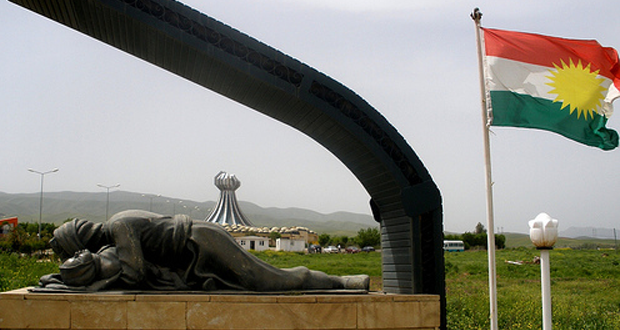On March 16 1988, I wasn´t even in this world. My parents hadn´t even met yet for there to a potential me in this world… but while millions of babies, children and later adults had not yet been born, in a town in Kurdistan, by the name of Halabja, thousands died. A whole city completely wiped out. Their crime? Being Kurdish.
The Al’Anfal campaign, Halabja poison gas attack, Halabja massacre or Bloody Friday call it whatever you want but you cannot ignore the shear brutality and cruelty of the acts committed by the Baáth regime against the people of Halabja, the Kurds and Kurdistan.
In just under an hour the attack killed 5,000 civilians, and injured 10,000 more- of which 68% were said to be women and children. Thousands more have died and are still dying of complications, diseases and birth defects due to the chemical bombing. The city of Halabja was destroyed and its inhabitants and those of nearby villages were displaced, leaving nearly 70,000 homeless. Forget the countless acts of Saddam Hussien and his regime against the Kurds in Başûr (South Kurdistan), the millions of Kurdish people he captured, tortured, slaughtered, massacred and killed. This incident alone, to this very day, still remains the largest chemical weapons attack directed against a civilian-populated area in history. Yet, I bet for many of you this is the first time you have heard about it. The world knows so much about modern day genocide the Bosnians by the Serbs, the tragedy of Rwanda, Hitler against the Jews but very little is known and understood about the Kurdish story.
An estimated 180,000 Kurds were killed by Saddam´s regime under the Al’Anfal campaign. However, 24 years on the Kurdish people are still waiting to be heard, recognized and ultimately given justice for the crimes committed against them. In a recent meeting at the British parliament to commemorate the anniversary of Halabja in 1988, to urge international recognition of the genocide, and build momentum for an e-petition* for this very purpose, Lord Harris of Harringay stated that,
“The tragedy of the Kurdish people deserves recognition by the international community. The genocidal activity perpetrated against them over the last fifty years must not be forgotten and I support the campaign and the e-petition associated with it.”
Other parliamentarians from Britain and Kurdistan all sent messages of support and spoke about the reasons why the genocide of the Kurds must not be forgotten and the importance of international recognition. Meg Munn, MP for Sheffield Heely and All Party Group on the Kurdistan Region spoke about why it is important to take such steps for recognition by stating that,
“Commemorating what happened helps us to understand the situation of Kurdish poeple today and is one step we can take to try and stop it happening again.”
Fabian Hamilton, MP for Leeds North East, who spoke about his recent visit to Kurdistan told the meeting about what he had witnessed whilst there. He explained that 300 mass graves have been discovered, unearthing hundreds of bodies.
“There are also pits with just bones. We saw this for ourselves when we went to the far north area of Garmian. Row after row of baby sized coffins, filled with bones. Incomplete, unable to be identified.The mass graves are still contaminated with the poison, posing huge risks for those trying to retrieve the remains of those murdered. It is a tragedy that any people on this earth are still subjected to torture and murder on the grounds of their ethnic and cultural background. The Kurdish people must be allowed their autonomy and freedom from genocide so that, like most people in the world, they may live in peace and security wherever they are.”
Many people, including Kurds and non-Kurds, are still very bitter about the involvment of countries such as the British and USA in the masscring of Kurds under the Baáth regime. However, they fail to understand that holding a grudge will not change anything. Nothing will bring back the lives lost, nothing will remove the memories burned into our hearts forever or heal the pain that every Kurd carries for the suffering of its people. We can only move forward from here, never forget the crimes commited against Kurdistan and make sure the world doesn´t either.
I will sign off with a quote by Richard Beeston, The Times foreign editor, who was one of the first journalist on the ground in Halabja in 1988 and said…
“Kurdistan is a shining example to others of what is possible if you take your fate into your hands and fight for your democratic rights.”
*If you are a British citizen or have British residency SIGN THE PETITION: http://epetitions.direct.gov.uk/petitions/31014I

